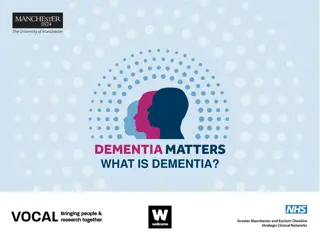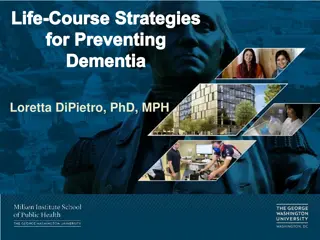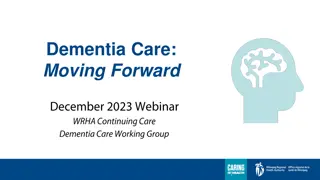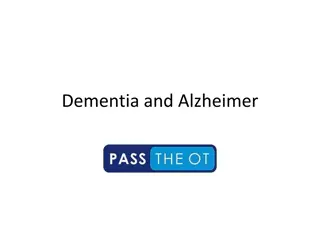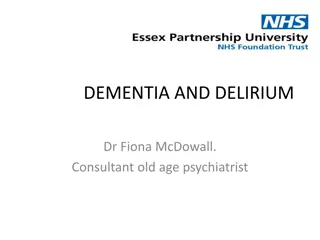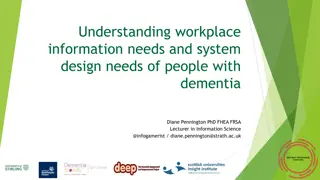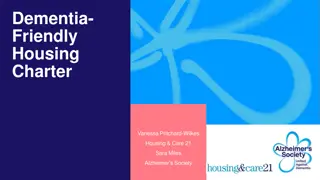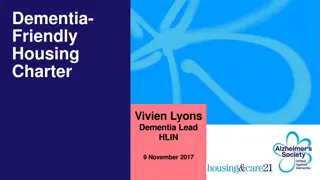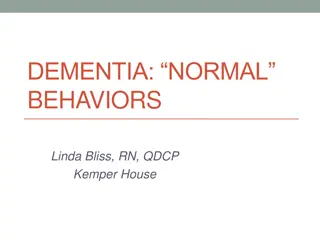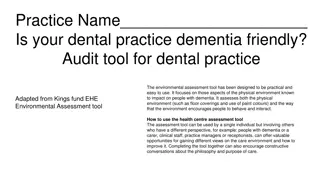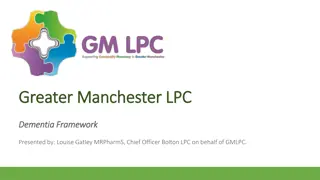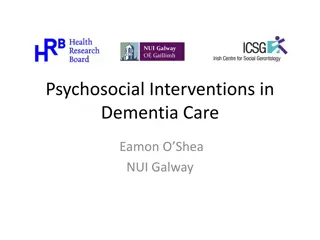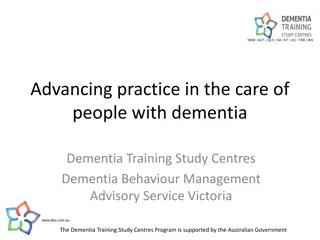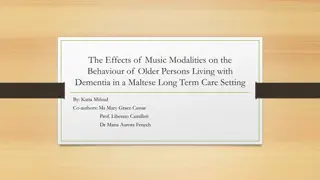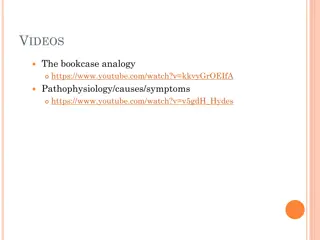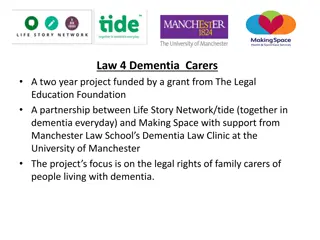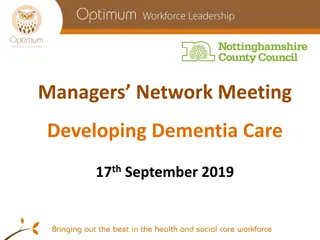Comprehensive Overview of Dementia Treatment Strategies
Dementia, a syndrome resulting from various diseases affecting nerve cells and brain function, leads to cognitive decline. Treatment approaches include pharmacological and non-pharmacological interventions such as biomarker monitoring, lifestyle modifications, and addressing risk factors like hypertension and social isolation. Strategies encompass early detection with biomarkers, lifestyle changes like hearing aids and reducing air pollution, and addressing comorbid conditions. Case vignettes highlight the relevance of individualized care for older adults like Susan Claypond, aged 84, with hypertension.
- Dementia treatment
- Biomarker monitoring
- Lifestyle modifications
- Cognitive decline
- Individualized care
Download Presentation

Please find below an Image/Link to download the presentation.
The content on the website is provided AS IS for your information and personal use only. It may not be sold, licensed, or shared on other websites without obtaining consent from the author. Download presentation by click this link. If you encounter any issues during the download, it is possible that the publisher has removed the file from their server.
E N D
Presentation Transcript
Treatment of dementia (Pharmacology/non-pharm) Dr Ciaran Abbey Old age psychiatrist
Dementia is a syndrome that can be caused by a number of diseases which over time destroy nerve cells and damage the brain, typically leading to deterioration in cognitive function (i.e. the ability to process thought) beyond what might be expected from the usual consequences of biological ageing. WHO definition While consciousness is not affected, the impairment in cognitive function is commonly accompanied, and occasionally preceded, by changes in mood, emotional control, behaviour, or motivation.
Alzheimers disease progression of biomarkers
PET -3 amyloid tracers CSF-A 42/40 highly concordant with PET, A abnormalities may be detected earlier, appropriate use criteria established in 2018 Blood-plasma A 42/40 reflects PET, plasma p-tau181, p- tau217, p-tau231 -?role for screening/triage, maybe predict disease risk, track progression & monitor treatment response, But large no s have comorbid pathologies e.g. vascular lesions, -synuclein, other misfolded proteins AND data lacking in over 85s, at risk middle aged, diverse populations Digital- monitoring of response But privacy/data issues, specificity & sensitivity, user friendliness/access, reliability, costs Biomarkers
If people use hearing aids their risk decreases to those without hearing impairment When air pollution reduces cognition better than in comparator areas, Changing risk factors-does it change things? When hypertension treated then less dementia People without much education relatively protected by jobs with high cognitive demands
Smoking Depression Late life changes to improve outcomes Physical inactivity Air Pollution Social isolation and lack of stimulation Diabetes
Case Vignettes: Case 1 Susan Claypond age 84 Lives alone History of hypertension Amilodipine 5mg mane Case 2 Eric Sandcram age 72 Lives with his wife Atrial fibrillation Chronic kidney stage 3 Aortic valve replacement Hypertension Hypercholesterolemia Osteoarthritis Current Medication: Apixaban 2.5 mg BD, Bendroflumethiazide 2.5mg, Bisoprolol 3.75mg and Simvastatin 40mg.
Case Vignette Case 3 Connie Wise age 98 Lives with daughter No medication Mobile with frame, no falls Reports no issues with her memory Case 4 Jim Weatherhead age 80 Lives with his wife Vascular history and COPD Has been prescribed Donepezil 5mg Osteroarthritis pain Poor sleep, agitated through the day Wife struggling to cope
Thank you all great presentations Any questions?









